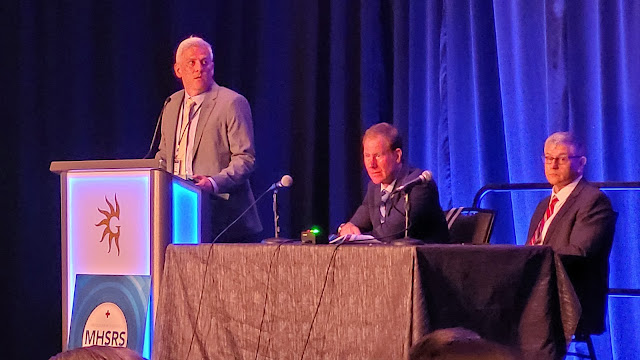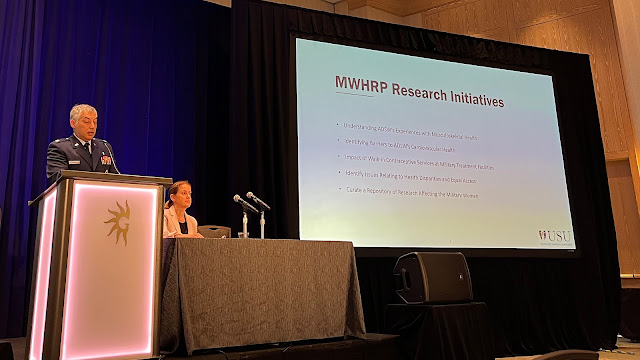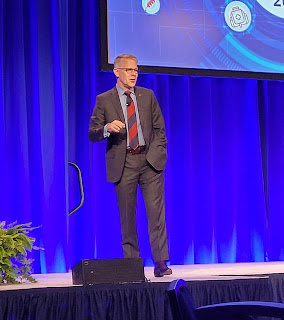“An Environment of Collaboration”: Thousands of Researchers Gather for Military Health System Research Symposium
The first day of the 2023 Military Health System Research Symposium brought together more than 3,800 people from across the globe.
August 15, 2023 by Zachary Willis
“In so many ways, MHSRS is a real homecoming,” the Honorable Lester Martínez López said, welcoming more than 3,800 people from across the Military Health System to the first day of the 2023 Military Health System Research Symposium (MHSRS) in Orlando, Florida.
Martínez López’s opening remarks addressed the wide range of topics represented at this year’s conference, including special emphasis on the growing need for mental health care and the role of artificial intelligence (AI) and other technology in the face of a changing landscape.
“We must use technology to provide relief,” he said, “to stretch our capabilities without burning out our people, while providing the best care for those that need it.”
Closing his remarks, Martínez López issued a challenge to the audience to continue working to create an “environment of collaboration.”
This year’s MHSRS convenes 2,400 abstracts across 67 areas of research with 460 oral presentations and nearly 1,400 posters, representing the same environment of collaboration challenged by Martínez López and underscored by speaker Dr. Paul Friedrichs, Uniformed Services University (USU) alumnus and director of the newly established White House Office of Pandemic Preparedness and Response Policy, whose talk emphasized a call to action: “be bold.”
“How do we accurately reflect the safety and the effectiveness of the recommendations – the vaccines, the therapeutics, the surgical interventions that we’re offering –” Friedrichs questioned, “with the credibility that allows a mom or dad to believe that if their son is injured or becomes ill, we will have the best possible care for them.”
Throughout the first day of the symposium, the Uniformed Services University was represented across multiple breakout sessions and panels, including a discussion entitled “Casualty Care Across the Continuum” which featured USU Department of Physical Medicine and Rehabilitation chair Dr. Paul Pasquina.
USU Department of Preventive Medicine and Biostatistics professor Dr. Tracey Koehlmoos’s presentation, “A Qualitative Assessment of Ukraine’s Trauma System During the Russian Conflict: Experiences of Volunteer Healthcare Providers,” brought a packed crowd eager to stay up to date on the relevance of recent events.
 |
The Honorable Dr. Lester Martínez López opens MHSRS 2023 day one, welcoming over 3800 attendees to the conference. (Photo credit: Zachary Willis, USU) |
 |
School of Medicine dean Dr. Eric Elster (center) moderates a breakout session from USU's SC2i. (Photo credit: Sarah Marshall, USU) |
 |
Lt. Col. Cubby Gardner, a GSN assistant professor, discusses the Military Women's Health Research Program. (Photo credit: Zachary Willis, USU) |
The conference also included a breakout session from USU’s Surgical Critical Care Initiative (SC2i) moderated by School of Medicine dean Dr. Eric Elster, a presentation from the Center for Health Services Research’s Amanda Banaag about “Racial Disparities in Perinatal Outcomes Among the U.S. Armed Forces,” and Graduate School of Nursing assistant professor Lt. Col. Cubby Gardner’s discussion of the Military Women’s Health Research Program.
One of the highlights of the opening day’s events was the presentation of the MHSRS Distinguished Service Award to USU Department of Surgery professor Dr. Thomas Davis, who was lauded for his lifetime contributions to military medical research.
By the end of the first day at MHSRS 2023, the Honorable Martínez López’s words still echoed through the symposium halls, orchestrating the spirit of collaboration spread across thousands of convention goers.
“There is no mission more important than caring for our people.”







